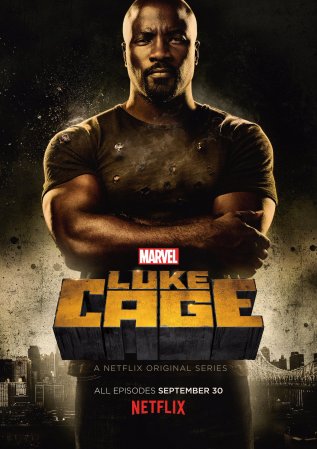
Genre: Superhero
Synopsis: Luke Cage is an escaped convict who was falsely accused, lying low and hiding his superpowers. But the man who’s giving him a job is deeply concerned with the inhabitants of Harlem, and when he runs afoul of a local gangster, Luke is pulled into the spotlight. This forces him to make a decision–run away to a place where no one knows his name, or stand and fight for his place in the community.
Series: First season is up.
I’ve Watched: All of season one.
Verdict: Good story with powerful characterization, though the pacing was off.
(video)
I really enjoyed this show, and it’s heavy reliance on characterization. Everyone’s motivations and experiences were fleshed out. Nothing about them was glossed over. Luke Cage really spends time on its characters, honing in on their reactions to their experiences instead of pushing them aside.
Luke himself is calmly quiet. His outbursts are rare, and he’s been on the defensive for so long that it takes a lot to push him into standing his ground. His backstory and how it informs who he’s become is revealed slowly. He has several deep and complicated relationships with other characters–Pop, who cares about the kids in the neighborhood and pushes Luke to look beyond himself. Misty, who doesn’t quite know whether she should believe in him. Even Cottonmouth, the gangster who can’t let go of his animosity towards Luke, as they battle over everything from their vision for the community to their relationship with Pop.
The show also touches on Luke’s relationship with Reva, his deceased wife. Reva first appeared in Jessica Jones as a gimmick, only there to drive Luke and Jessica’s actions. We didn’t know anything about her as a person, or about the specifics of her relationship with Luke. So it was nice to have those blanks filled in by this series. It shows us why Reva is so special to Luke, and it lets her stand as her own character. And she’s interesting in her own right: as someone gentle and caring, but with secrets and a hidden strength. She’s also interesting in terms of how she still matters in Luke’s life even long after her death.
But Luke’s past isn’t the only one that gets highlighted–there’s plenty of background to drive all of the characters’ motivations. His sometimes ally Misty came from this Harlem community, and has ties to it. We learn a lot of things that are deeply personal to her, from her friendship with her partner–especially in one good scene that really managed to sell it–to the events of her past that still motivate her. She’s one of the most interesting characters on the show, trying so hard to tough everything out only to realize that she can’t always do that. That she can’t always bury her vulnerabilities.
Luke’s rival, Cottonmouth, has his own personal history driving him. His relationship with his family made him who he is, and he’s still influenced by the path in life that he didn’t take. Cottonmouth’s cousin, Mariah, has been pushed into different directions all her life, because of the choices her relatives have made for her. A lot of her motivation comes from deciding how to handle that, and how she’s going to react to the lack of respect she experiences. Both of these characters create a sense of who they could have been, if things had been different. Like their whole lives are one big missed opportunity.
Luke Cage really knows how to convey those character moments, too. Some scenes were shot in a way that was emotionally powerful without any dialogue–Cottonmouth’s trembling hands clasped above his piano, Misty shaking in the interrogation room. Even the tone of the music at Cottonmouth’s nightclub changes depending on who’s choosing it.
All of that, the laser focus on characterization and how it’s shown, are the story’s greatest strength. It really makes the experience. But the show has flaws too, the greatest of which is probably its pacing. The show is too disjointed–it feels more like a series of happenings than a cohesive single story. There could have been better transitions, and certain information could have been introduced earlier, so it didn’t feel like it came out of nowhere. The show has a tendency to under-explain in general, though this is vastly preferable to over-explaining.
And despite the good character work, the playing field feels a little too crowded. There might be just a few too many factions, with the upper hand passing between all of them too often.
Despite these faults, all of the individual elements that went into Luke Cage were good. The character work, the focus on each person’s experiences and how those experiences make them. Overall, I really enjoyed this show, and I’m excited to see another season.
(Also, Luke, never refuse a lawyer when talking to the police–doesn’t matter if you’re not guilty, if you’re under suspicion for any reason, get a lawyer.)
Science:
I’m not paying much attention to the details, but there was something that I wanted to mention from a general standpoint. Which is, that I like that when Claire and that doctor were trying to figure out a way to deal with a superpower they didn’t understand, they didn’t magically come up with an idea and have everything go perfectly. Things didn’t work, and they had to troubleshoot. Everything they did was portrayed as risky and uncertain. (Also, probably illegal and unethical, from a real-world standpoint–which I feel obligated to at least mention.)
Though, I don’t understand the quote, “sometimes you’ve got to throw out the science and go for what you know.” That makes no sense. Especially since what Claire knows is based on science.
Favorite Quotes:
“You can’t control what people say, just, be the best man that you can be.”

Pingback: We Don’t Live in a Homogenous World: List of 10 Science Fiction/Fantasy Works | Bardic Impulses